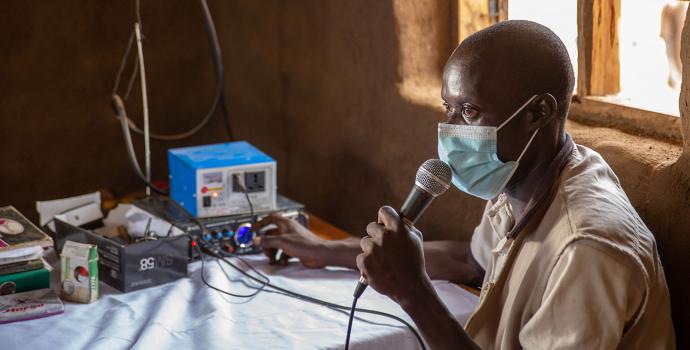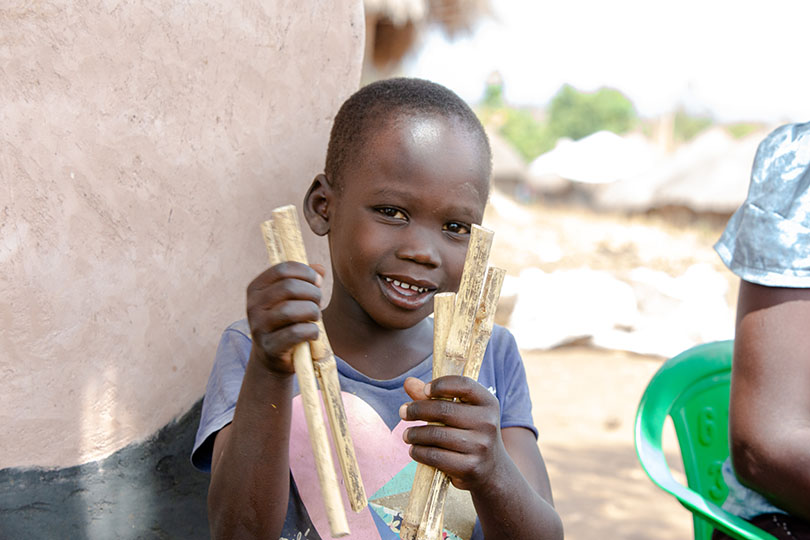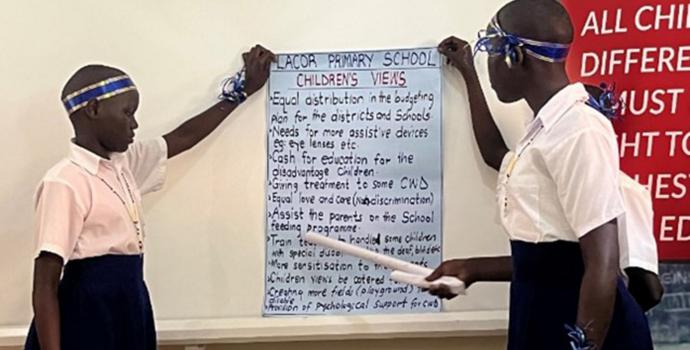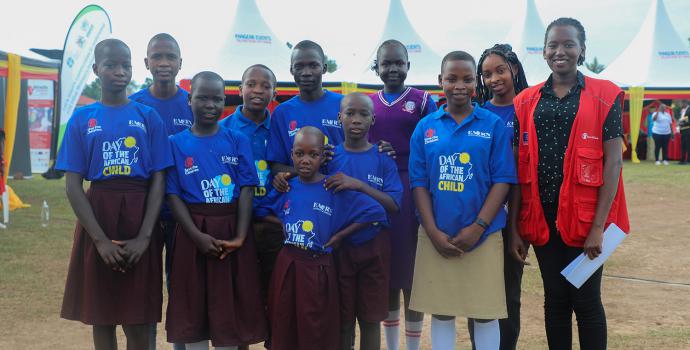Community radios bringing home learning to refugee children

Robert delivering a lesson on the community radio in Bidi Bidi Refugee Settlement.
Robert is a 26-year-old caregiver with SC-Uganda at Yanzagi Early Childhood Care and Development Centre in Bidi Bidi refugee settlement, West Nile Uganda. He has been teaching refugee children basic literacy and Maths since 2018. His classes consist of children aged between 3 and 6 years.
When schools closed following the outbreak of COVID-19, Save the Children installed community radios in the settlement where caregivers such as Robert deliver lessons to children watch video here. These radios are solar powered and broadcasting is done through amplifying the caregiver’s voice with megaphones (usually three in number to widen coverage). However, the reach of these radios is only about three kilometres in the settlement.
This way, children have been learning from their homes as they listen in to the lessons being delivered. In fact, when Robert starts teaching, the camp bursts into little voices of children repeating after his instructions!
But first, the caregivers created awareness about the radio lessons and the number of times they would run in a week. On the day of the lesson, upon consent of the parents, the caregiver is joined by two or three children in the studio, with whom he demonstrates as other children listen in.
According to Robert, these lessons have helped children to keep remembering what they were taught at the centre before schools were closed. And beyond learning, Robert says,
“the learning has built better relationships between parents and children as they interact more while helping them learn as well as caregivers and children when they visit homes to follow up on lessons and caregivers and parents.”
But Robert says, this kind of learning also comes with challenges. “Sometimes the long distances in the settlement make it difficult for us to follow up on some learners. Some parents are yet to embrace home learning. For these, we encourage them and even create materials for the children,” Robert says.
Musa* and how community radio helps him learn
Six-year-old Musa is a child at Yanzagi ECCD centre. He lives with his father, mother and four siblings. Ever since he stopped going to the centre following school closure, he enjoys learning at home but also the teaching on the community radio.
“The teacher asks us to write using sticks on the ground. We draw houses, trees, count with sticks. I picked stones from the neighbourhood to use them to count numbers,” Musa says. “I like going to school,” he adds.

Joseph*, my mother supports me learn from home
Joseph*, a 6-year-old Top class pupil, can now count and tell the difference between colours thanks to the support his mother gives him while learning from home.
Joseph who lives with four of his siblings, two girls and two boys last attended school at Ayivu ECCD centre in March 2020.
“I do not feel happy about not going to school. I miss being taught by my teachers and the playing materials at the learning centre,” Joseph says.
According to him, teachers would sometimes come and teach them from home but now it is his mother who does most of the teaching.
“I have learnt how to count and identify colours,” Joseph says.
In addition to teaching them school work, Joseph says their mother tells them to always be smart. When he grows up, Joseph would like to be a teacher and teach children.
When he is not learning, Joseph helps with home chores such as sweeping the compound, washing utensils and watering their vegetable garden.

Rosemary setting the trend on home learning in the neighbourhood
Rosemary is a 35-year-old mother of five children and two nieces under her care. To earn some money to supplement the family’s meals, she sells green vegetables from her small garden.
When she heard that schools were closed, she was disappointed because they would now start loitering in the village. And the children are themselves unhappy about the school closure. Despite teaching her children from home, she worries about them being promoted to other classes.
“My son Joseph would now be in Primary One. Juma who is in Primary Two would be in Primary Three,” she says.
Save the Children trained parents to deliver basic Maths and literacy at home and Rosemary was one of the parents trained. She learnt how to make learning materials such as ropes, balls but also assess the children’s progress.
But not every day is for Maths or Literacy. Rosemary says she sometimes gives the children papers to draw pictures and makes them skip the rope.
The routine she has made which includes counting, drawing, skipping, she says, is aimed at creating a structure in the children.
“I am happy that Joseph can tell colours apart like purple from green and blue. I am also happy that my children are learning and when they return to school, their minds will be fresh,” she said.
As the country waits for schools to reopen, Save the Children appreciates the efforts made by parents, caregivers and programme teams to ensure children between 3 and 6 years do not miss out on learning.




